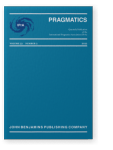Vol. 32:2 (2022) ► pp.159–190
Invoking divine blessing
The pragmatics of the congratulation speech act in university graduation notebooks in Jordan
This study explores the speech act of congratulation in university graduation notebooks, a new communicative context in Jordan. Using the concept of the pragmeme as a situated speech act, a total of 1064 congratulatory messages, found in 35 notebooks, were analyzed. The analysis demonstrated that the cultural concept of baraka ‘blessing’ plays a central role in the Arabic congratulation speech act. Embedded in its production are other speech acts such as compliments and advice, sociocultural beliefs and concepts such as fatalism and collectivism, and sociocultural practices such as naqout ‘money given as a gift’. Invoking these values and beliefs when performing congratulations was accomplished through ritualistic religious invocations, formulaic expressions, reference to collective identity, and acts of material support, showing how this Arabic speech act is situated in sociocultural beliefs and values.
Article outline
- 1.Introduction
- 2.Research overview
- 3.Arab culture
- 4.Theoretical background
- 5.Data and methodology
- 5.1Data
- 5.2Methodology
- 6.Analysis
- 6.1Opening
- 6.2The body
- 6.2.1Expressing well wishes
- 6.2.2Complimenting
- 6.2.3Banter
- 6.2.4Evoking shared experiences
- 6.2.5Expressing validation
- 6.2.6Using expressions of encouragement
- 6.2.7Expression of happiness
- 6.2.8Using self-directed well wishes
- 6.2.9Attaching a ‘gift’
- 6.3Closing formulae
- 7.Conclusion
- Acknowledgements
-
References
